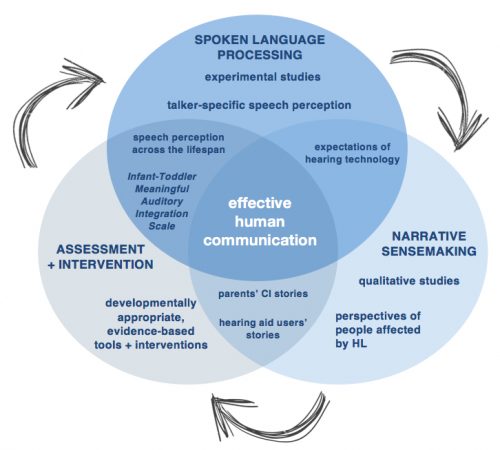Aural (re)habilitation is the reduction of hearing-loss-induced deficits of function, activity, participation, and quality of life through a combination of different approaches, such as sensory management (e.g., via hearing aids or cochlear implants), instruction, perceptual training, and counseling. It is a field with roots in the United States from over 50 years ago and the research contributing to the field comes from an array of subspecialty fields (e.g., bench science work in electrical engineering to behavioral research in cognitive science). Over the years these methods have been employed independently and caused professionals to approach aural (re)habilitation as “mainly a medical and technical matter”. Thus, a holistic approach to hearing healthcare is still missing from the field of communication sciences and disorders. Without a holistic, family-centered approach to aural (re)habilitation, professionals are limited in their abilities to provide people with hearing loss the tools and skills to navigate their world. In the Aural Rehabilitation lab, we work towards such a holistic approach by conducting experimental and qualitative research with people of all ages and with all levels of hearing from a multidisciplinary approach. These research efforts often overlap and are centered on a common goal: to provide human beings relying on listening and spoken language with the opportunity to effectively communicate with those around them. The following overarching goals guide our research program: 1) employ experimental studies to understand the sensory encoding of talker-specific information in the speech signal and its role in spoken language processing, 2) employ the qualitative methodology of narrative sensemaking to identify and understand the perspectives of people affected by hearing loss; and 3) employ both experimental and qualitative studies to generate evidence-based, developmentally appropriate assessment and intervention tools for the aural (re)habilitation of people with hearing disorders.
- Dept. of Communicative Disorders + Deaf Education
- 435.797.5748
- AuralRehabLab@usu.edu
Research Framework

Spoken Language Processing
We are interested in understanding how people learn about their world through listening—especially in situations when listening may be particularly challenging (e.g., when listening to a teacher with a foreign accent or listening through a CI device). We propose that when we can better understand how people overcome listening challenges, we can then use that knowledge to help establish aural (re)habilitation programs and empower people to be effective communicators throughout their lives. The majority of the behavioral experiments we conduct in the lab draw from cognitive hearing science and explore the mechanisms and developmental processes underlying human spoken language processing. We are particularly interested in learning about the role that the talker-specific information in the speech signal plays in human listeners’ spoken language processing. Thus, our experimental research works to answer the question: When does perceptual access to talker-specific information facilitate human spoken language processing and when does talker-specific information hinder it?
Narrative
Sensemaking
Families who are structurally/legally different from the American notion of a “traditional family” are called discourse dependent. Members of discourse dependent families are more reliant on communication to establish a family identity than members of families with structural ties or without disabilities. Families who have members with invisible disabilities, such as hearing loss, are particularly discourse dependent. One way families make sense of and construct a shared identity is through telling stories; this is also known as narrative sensemaking. Research shows that narrative sensemaking, especially in discourse dependent families, influences family members’ wellbeing, self-esteem, and overall self-concept. We propose that similar principles are at work for families that include adults and/or children with hearing loss. We gather stories from people affected by hearing loss and explore these issues via a series of qualitative studies using interpretive narrative and grounded theory methodologies.
Assessment + Intervention Development
It is the intention of audiologists and speech-language pathologists alike to engage in evidence-based practice to the best of their abilities. However, some clinical practice is restricted by slow progress in the laboratory—in other words, without the evidence the practice is limited. This is the case for the aural (re)habilitation of people with hearing loss. Often times there is little evidence available and when it is available, it is not robust. In order to ensure that people with hearing loss have an opportunity to effectively communicate with those around them, my lab draws from our research on spoken language processing and narrative sensemaking to generate evidence-based, developmentally appropriate assessment and intervention tools for use in the field of aural (re)habilitation.